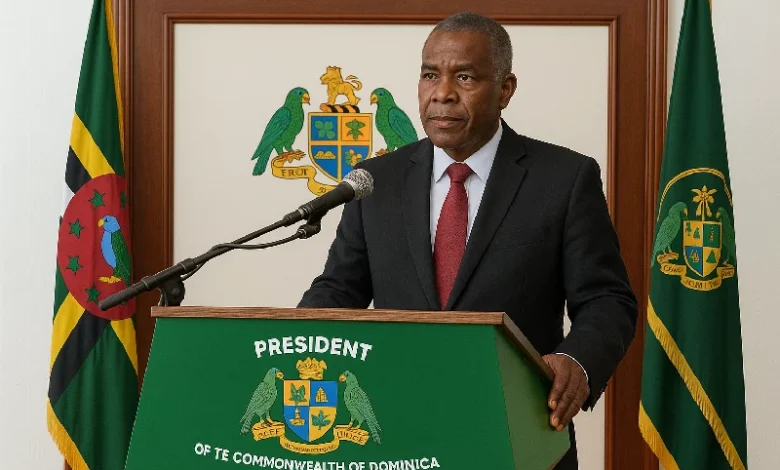President of Dominica

The President of Dominica serves as the Head of State and is the highest constitutional authority in the country. Though largely ceremonial in daily governance, the President plays a critical role in safeguarding the Constitution, overseeing formal state matters, and ensuring the continuity of government. The position symbolizes national unity and the rule of law, standing above the political fray to maintain the country’s democratic integrity.
Role and Functions
The President’s responsibilities are defined primarily in the Constitution of the Commonwealth of Dominica, particularly in Chapter III. The President’s powers and duties include:
- Appointment of the Prime Minister: Appoints as Prime Minister the member of the House of Assembly who appears most likely to command the majority’s confidence.
- Appointment of Ministers: On the advice of the Prime Minister, appoints other Ministers of Government from among elected representatives and senators.
- Assent to Legislation: Signs bills passed by the House of Assembly into law, a necessary final step before laws take effect.
- Representation in International Affairs: Serves as the figurehead for Dominica during the ceremonial reception of foreign dignitaries and the signing of treaties, although day-to-day foreign policy is conducted by the government.
- Command of the Defense Force: Formally holds supreme command of any defense forces, although operational control lies with the government.
- Summoning and Dissolving Parliament: Has the authority to summon, prorogue, and dissolve Parliament on the advice of the Prime Minister.
- Pardons and Commutations: Exercises the prerogative of mercy, including granting pardons, commuting sentences, or remitting fines.
- Appointment of Independent Officials: Appoints members of constitutional commissions such as the Public Service Commission, Police Service Commission, and Electoral Commission, usually based on consultations with political leaders to maintain impartiality.
- Oversight of Elections: Plays a ceremonial role in calling elections, based on the advice of the Electoral Commission and Prime Minister.
Although executive power is formally vested in the President, the day-to-day exercise of that power is carried out by the Cabinet. The President acts on the advice of the Prime Minister and Cabinet except where the Constitution expressly provides otherwise.
Selection and Tenure
The President of Dominica is elected by the House of Assembly for a term of five years and may be re-elected for additional terms. The process requires consensus: the Prime Minister and the Leader of the Opposition must jointly nominate a candidate. If they fail to agree, separate nominations are submitted, and a vote is held in the House.
A President may resign, be removed for misconduct or inability to perform the functions of office, or leave office at the end of their term. The President’s impartiality and symbolic leadership are critical to Dominica’s constitutional democracy.
List of Presidents of Dominica
Since becoming an independent republic within the Commonwealth on November 3, 1978, Dominica has had a distinguished line of Presidents:
- Sir Louis Cools-Lartigue (Acting President) – November 1978 to January 1979
- Frederick Degazon – January 1979 to June 1979
- Louis Cools-Lartigue (Acting President again) – June 1979 to February 1980
- Jenner Armour (Acting President) – February 1980 to October 1980
- Aurelius Marie – October 1980 to December 1983
- Clarence Seignoret – December 1983 to October 1993
- Crispin Sorhaindo – October 1993 to October 1998
- Vernon Shaw – October 1998 to October 2003
- Nicholas Liverpool – October 2003 to September 2012
- Eliud Williams – September 2012 to October 2013
- Charles Savarin – October 2013 to October 2023
- Sylvanie Burton – October 2023 to present
Each of these leaders has contributed to maintaining constitutional governance, offering stability during political transitions, and representing Dominica on ceremonial occasions.
Importance of the Presidency
The presidency in Dominica embodies the ideals of impartiality, unity, and constitutionalism. While the Prime Minister and Cabinet wield executive authority, the President remains a guardian of constitutional order, stepping in during moments that require neutral oversight or symbolic leadership. The office ensures that governance adheres to the rule of law and that all citizens, regardless of political affiliation, are served under a common national identity.
Through its history of capable leadership and constitutional fidelity, the role of the President continues to be a vital institution in the civic and political life of Dominica.




